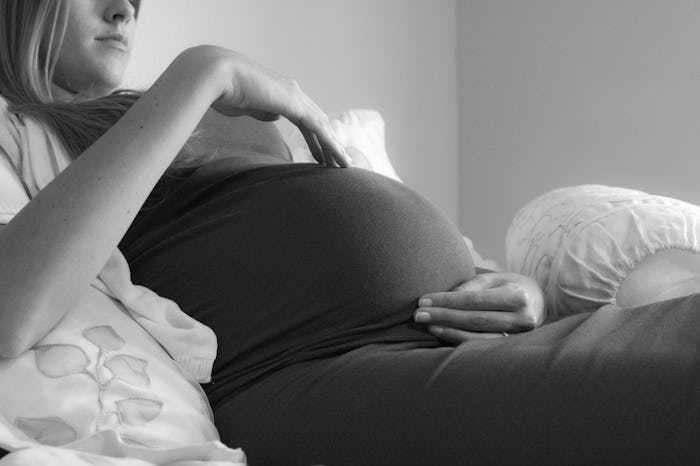Labor Signs

Your Pregnancy Diarrhea Doesn't Necessarily Mean Labor Is Near
I know. If you're going to poop this much, shouldn't you get a reward of some kind?
As the days after your due date begin ticking by, you’ll probably start looking for any sign of impending labor. Many women are often Googling questions about any symbol, sign, or indication that labor could be imminent, and if something changes — like you're suddenly pooping all day — they'll very quickly pivot to wondering if diarrhea is a sign of labor. Will your contractions begin after some time on the toilet? Should you be timing your own poops? Apparently there is a theory that your body expels waste to clean you out when you're about to go into labor. So every time you experience loose stools after your due date, should you throw the hospital bag in the car?
One quick internet search will convince you that diarrhea is, in fact, often a definite sign of upcoming labor. But the certainty of that claim is debatable. California OB-GYN Dr. Thomas Ruiz tells Romper he thinks the assertion is false — but that there is a caveat. "Diarrhea is not typically a sign that labor is about to come," the Orange County-based physician says. "Although, when a woman is having regular uterine contractions, loose stools are not uncommon.” Ah. So just a big mind game then, huh?
The Distinction Between Regular Loose Stools & Going Into Labor
It may sound like Ruiz is contradicting himself, but there is an important distinction between the two ideas. Experiencing diarrhea alone does not mean that labor will begin in the next 24 hours; it just means you should probably stay near a bathroom. (You were probably near one anyway at nine months pregnant.)
However, Ruiz explains, if you are having regular contractions, even mild ones, diarrhea may very well be an accompanying symptom. It's common for your bowels to empty during labor — even early labor — but diarrhea in and of itself doesn't really mean anything. (Believe me, I should know: I analyzed every poop I took for a week straight.)
Sutter Health lists "diarrhea or flu like symptoms without fever" as common signs of impending labor, however, and also mentions that "frequent bowel movements may be experienced within 48 hours of labor, cleansing the lower bowel in preparation for birth." So when it comes to seeking a definitive answer, there doesn't really seem to be one.
Predicting the onset of labor is notoriously difficult, not only because every woman is different, but also because every pregnancy and delivery experience is different as well. While my firstborn came a week early with zero symptoms except my water breaking in the middle of the night, my second was right on time in a quick and predictable way, and my third, as I've mentioned, came weeks after I started having "all" the symptoms. When it comes to childbirth, you really don't know what will happen until it's already begun.
Early Signs Of Labor
That being said, the U.S. Department of Health and Human Services' Office on Women's Health has a list of early signs of labor that includes bloody mucus discharge, contractions that grow stronger and more frequent, consistent lower back pain and cramping, and a pregnant person's water breaking.
Once you begin experiencing these regular uterine contractions, you can be sure that labor has definitely begun and you are officially in for the ride of your life. Like many women, you might have some diarrhea or loose stools at some point during labor (yes, some women poop during the pushing phase — yes, your OB-GYN, midwife, doula, or nurse will hardly notice). But then again, you might not. The only thing predictable about giving birth to a tiny human being? It's completely unpredictable.
Experts:
Dr. Thomas Ruiz, OB-GYN, Memorial Care Medical Group.
This article was originally published on